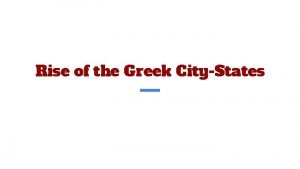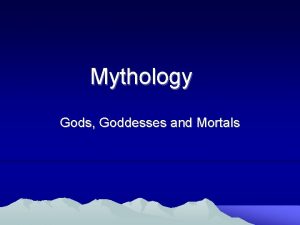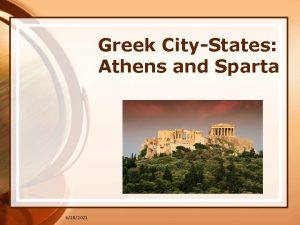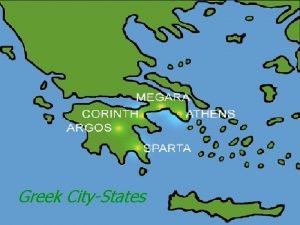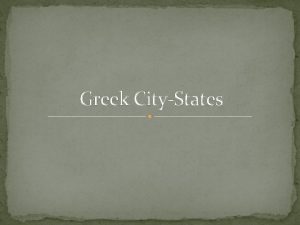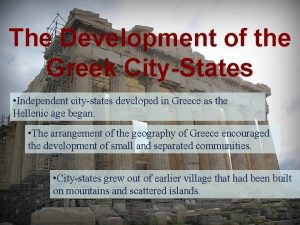Greek CityStates POLITICS AND SOCIETY Characteristics of CityStates











- Slides: 11

Greek City-States POLITICS AND SOCIETY

Characteristics of City-States (Polis) • • Around 800 BCE the polis (poleis) begin to form Allowed people to diversify in occupations The towns become walled cities Each city-state had a guardian deity • Ex. Athena= Athens • They communicated with gods through oracles • Oracle of Delphi • 730 BCE many city-states adopted the Phoenician alphabet and added vowels. • Governed by landowning families


Sparta • Ruled by a military aristocracy • Granted rights to the citizens • Social Hierarchy: Citizen Soldiers- decedents of original Spartans • “Dwellers around”- decedents of first conquered peoples. Could own land, were craftsmen's, and traders. Could not vote • Helots- slaves, lowest group, worked on the farms of citizens. • Women had more freedom. Ran estates but could not vote • • Young children trained to become soldiers • Oligarchy: • Governed by a group of elders in conjunction with two kings • Each group had a limited veto power (except slaves)


Athens • Formed a democracy over a 100 years or more • 507 BCE- direct democracy established • All men above 20 could join the assembly (governing body) • Women were not citizens and could not become soldiers • 120, 000 slaves • Skilled slaves lived with their masters • Other worked in the fields and silver mines • Athens was in direct competition with Sparta • Athens was a commercial center


Persian and Peloponnesian Wars MUCH OF WHAT IS KNOWN OF THESE WARS COME FROM THE WRITINGS OF HERODOTUS. A GREEK HISTORIAN • Persian Wars: • • • Greeks vs. Persians (Darius and Xerxes) 1 st Greek Victory at battle of Marathon (490 BCE) Thermopylae- Stand of 300 Spartans against thousands of Persians sack Athens after this Salamis- Naval battles that helps bring victory to the Greeks Delian League formed in 478 BCE (falls apart after the Persian Wars) • Peloponnesian Wars: 431 -404 BCE Athens vs Sparta • Sparta defeats Athens in 404 BCE • Both city-states decline during this time •


Pericles • Most famous Athenian statesman • Aristocrat • Wanted citizens to participate in assemblies to select officials and pass laws

 Greek citystates
Greek citystates Greek citystates
Greek citystates Gertler econ
Gertler econ What are the values of ancient greek culture
What are the values of ancient greek culture The greek miracle
The greek miracle Power and politics in organizations
Power and politics in organizations Risk and challenges of media and information
Risk and challenges of media and information Lesson 5 african american culture and politics
Lesson 5 african american culture and politics Bureaucracy and politics in india
Bureaucracy and politics in india Power politics and conflict in organizations
Power politics and conflict in organizations Ethics and politics in social research bryman
Ethics and politics in social research bryman Conflict power and politics
Conflict power and politics
